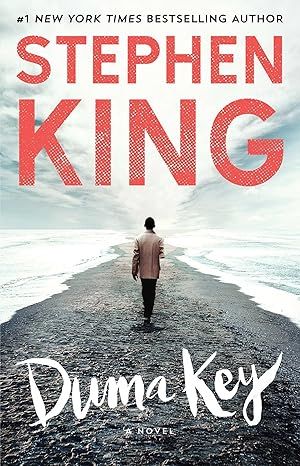Duma Key: A Novel
4.5
-
7,479 ratings
Master storyteller Stephen King’s classic, terrifying #1 New York Times bestseller of what happens when the barrier between our world and that of the supernatural is breached.
After a terrible construction site accident severs Edgar Freemantle’s right arm, scrambles his mind, and implodes his marriage, the wealthy Minnesota builder faces the ordeal of rehabilitation, all alone and full of rage. Renting a house on Duma Key—a stunningly beautiful and eerily undeveloped splinter off the Florida coast—Edgar slowly emerges from his prison of pain to bond with Elizabeth Eastlake, a sick, elderly woman whose roots are tangled deep in this place. And as he heals, he paints—feverishly, compulsively, his exploding talent both a wonder and a weapon. For Edgar’s creations are not just paintings, but portals for the ghosts of Elizabeth’s past…and their power cannot be controlled…
Kindle
$9.99
Available instantly
Audiobook
$0.00
with membership trial
Hardcover
$2.32
Paperback
$17.04
Ships from
Amazon.com
Payment
Secure transaction
ISBN-10
1501192256
ISBN-13
978-1501192258
Print length
640 pages
Language
English
Publisher
Scribner
Publication date
March 19, 2018
Dimensions
5.31 x 1.7 x 8.25 inches
Item weight
1.05 pounds
Popular highlights in this book
And clear communication between selves—the surface self and the deep self is what I mean—is the enemy of self-doubt. It slays confusion.
Highlighted by 769 Kindle readers
Parenting is the greatest of hum-a-few-bars-and-I’ll-fake-it skills.
Highlighted by 564 Kindle readers
Wireman would tell me God always punishes us for what we can’t imagine.
Highlighted by 519 Kindle readers
Product details
ASIN :
B000UZJREU
File size :
2329 KB
Text-to-speech :
Enabled
Screen reader :
Supported
Enhanced typesetting :
Enabled
X-Ray :
Enabled
Word wise :
Enabled
Editorial reviews
Stephen King is the author of more than sixty books, all of them worldwide bestsellers. His recent work includes the short story collection You Like It Darker, Holly (a New York Times Notable Book of 2023), Fairy Tale, Billy Summers, If It Bleeds, The Institute, Elevation, The Outsider, Sleeping Beauties (cowritten with his son Owen King), and the Bill Hodges trilogy: End of Watch, Finders Keepers, and Mr. Mercedes (an Edgar Award winner for Best Novel and a television series streaming on Peacock). His novel 11/22/63 was named a top ten book of 2011 by The New York Times Book Review and won the Los Angeles Times Book Prize for Mystery/Thriller. His epic works The Dark Tower, It, Pet Sematary, Doctor Sleep, and Firestarter are the basis for major motion pictures, with It now the highest-grossing horror film of all time. He is the recipient of the 2020 Audio Publishers Association Lifetime Achievement Award, the 2018 PEN America Literary Service Award, the 2014 National Medal of Arts, and the 2003 National Book Foundation Medal for Distinguished Contribution to American Letters. He lives in Bangor, Maine, with his wife, novelist Tabitha King.
Sample
1 -- My Other Life
i
My name is Edgar Freemantle. I used to be a big deal in the building and contracting business. This was in Minnesota, in my other life. I learned that my-other-life thing from Wireman. I want to tell you about Wireman, but first let's get through the Minnesota part.
Gotta say it: I was a genuine American-boy success there. Worked my way up in the company where I started, and when I couldn't work my way any higher there, I went out and started my own. The boss of the company I left laughed at me, said I'd be broke in a year. I think that's what most bosses say when some hot young pocket-rocket goes off on his own.
For me, everything worked out. When Minneapolis-St. Paul boomed, The Freemantle Company boomed. When things tightened up, I never tried to play big. But I did play my hunches, and most played out well. By the time I was fifty, Pam and I were worth forty million dollars. And we were still tight. We had two girls, and at the end of our particular Golden Age, Ilse was at Brown and Melinda was teaching in France, as part of a foreign exchange program. At the time things went wrong, my wife and I were planning to go and visit her.
I had an accident at a job site. It was pretty simple; when a pickup truck, even a Dodge Ram with all the bells and whistles, argues with a twelve-story crane, the pickup is going to lose every time. The right side of my skull only cracked. The left side was slammed so hard against the Ram's doorpost that it fractured in three places. Or maybe it was five. My memory is better than it used to be, but it's still a long way from what it once was.
The doctors called what happened to my head a contracoup injury, and that kind of thing often does more damage than the original hit. My ribs were broken. My right hip was shattered. And although I retained seventy per cent of the sight in my right eye (more, on a good day), I lost my right arm.
I was supposed to lose my life, but didn't. I was supposed to be mentally impaired thanks to the contracoup thing, and at first I was, but it passed. Sort of. By the time it did, my wife had gone, and not just sort of. We were married for twenty-five years, but you know what they say: shit happens. I guess it doesn't matter; gone is gone. And over is over. Sometimes that's a good thing.
When I say I was mentally impaired, I mean that at first I didn't know who people were -- even my wife -- or what had happened. I couldn't understand why I was in such pain. I can't remember the quality of that pain now, four years later. I know that I suffered it, and that it was excruciating, but it's all pretty academic. It wasn't academic at the time. At the time it was like being in hell and not knowing why you were there.
At first you were afraid you'd die, then you were afraid you wouldn't. That's what Wireman says, and he would have known; he had his own season in hell.
Everything hurt all the time. I had a constant ringing headache; behind my forehead it was always midnight in the world's biggest clock-shop. Because my right eye was fucked up, I was seeing the world through a film of blood, and I hardly knew what the world was. Nothing had a name. I remember one day when Pam was in the room -- I was still in the hospital -- and she was standing by my bed. I was extremely pissed that she should be standing when there was a thing to sit on right over in the cornhole.
"Bring the friend," I said. "Sit in the friend."
"What do you mean, Edgar?" she asked.
"The friend, the buddy!" I shouted. "Bring over the fucking pal, you dump bitch!" My head was killing me and she was starting to cry. I hated her for that. She had no business crying, because she wasn't the one in the cage, looking at everything through a red blur. She wasn't the monkey in the cage. And then it came to me. "Bring over the chum and sick down!" It was the closest my rattled, fucked-up brain could come to chair.
I was angry all the time. There were two older nurses that I called Dry Fuck One and Dry Fuck Two, as if they were characters in a dirty Dr. Seuss story. There was a candystriper I called Pilch Lozenge -- I have no idea why, but that nickname also had some sort of sexual connotation. To me, at least. When I grew stronger, I tried to hit people. Twice I tried to stab Pam, and on one of those two occasions I succeeded, although only with a plastic knife. She still needed a couple of stitches in her forearm. There were times when I had to be tied down.
Here is what I remember most clearly about that part of my other life: a hot afternoon toward the end of my month-long stay in an expensive convalescent home, the expensive air conditioning broken, tied down in my bed, a soap opera on the television, a thousand midnight bells ringing in my head, pain burning and stiffening my right side like a poker, my missing right arm itching, my missing right fingers twitching, no more Oxycontin due for awhile (I don't know how long, because telling time is beyond me), and a nurse swims out of the red, a creature coming to look at the monkey in the cage, and the nurse says: "Are you ready to visit with your wife?" And I say: "Only if she brought a gun to shoot me with."
You don't think that kind of pain will pass, but it does. Then they ship you home and replace it with the agony of physical rehabilitation. The red began to drain from my vision. A psychologist who specialized in hypnotherapy showed me some neat tricks for managing the phantom aches and itches in my missing arm. That was Kamen. It was Kamen who brought me Reba: one of the few things I took with me when I limped out of my other life and into the one I lived on Duma Key.
"This is not approved psychological therapy for anger management," Dr. Kamen said, although I suppose he might have been lying about that to make Reba more attractive. He told me I had to give her a hateful name, and so, although she looked like Lucy Ricardo, I named her after an aunt who used to pinch my fingers when I was small if I didn't eat all my carrots. Then, less than two days after getting her, I forgot her name. I could only think of boy names, each one making me angrier: Randall, Russell, Rudolph, River-fucking-Phoenix.
I was home by then. Pam came in with my morning snack and must have seen the look on my face, because I could see her steeling herself for an outburst. But even though I'd forgotten the name of the fluffy red rage-doll the psychologist had given me, I remembered how I was supposed to use it in this situation.
"Pam," I said, "I need five minutes to get myself under control. I can do this."
"Are you sure -- "
"Yes, now just get that hamhock out of here and stick it up your face-powder. I can do this."
I didn't know if I really could, but that was what I was supposed to say. I couldn't remember the fucking doll's name, but I could remember I can do this. That's clear about the end of my other life, how I kept saying I can do this even when I knew I couldn't, even when I knew I was fucked, I was double-fucked, I was dead-ass-fucked in the pouring rain.
"I can do this," I said, and God knows how I looked because she backed out without a word, the tray still in her hands and the cup chattering against the plate.
When she was gone, I held the doll up in front of my face, staring into its stupid blue eyes as my thumbs disappeared into its stupid yielding body. "What's your name, you bat-faced bitch?" I shouted at it. It never once occurred to me that Pam was listening on the kitchen intercom, she and the day-nurse both. Tell you what, if the intercom had been broken they could have heard me through the door. I was in good voice that day.
I began to shake the doll back and forth. Its head flopped and its synthetic I Love Lucy hair flew. Its big blue cartoon eyes seemed to be saying Oouuu, you nasty man! like Betty Boop in one of those old cartoons you can still see sometimes on the cable.
"What's your name, bitch? What's your name, you cunt? What's your name, you cheap rag-filled whore? Tell me your name! Tell me your name! Tell me your name or I'll cut out your eyes and chop off your nose and rip out your -- "
My mind cross-connected then, a thing that still happens now, four years later, down here in the town of Tamazunchale, state of San Luis Potosí, country of Mexico, site of Edgar Freemantle's third life. For a moment I was in my pickup truck, clipboard rattling against my old steel lunchbucket in the passenger footwell (I doubt if I was the only working millionaire in America to carry a lunchbucket, but you probably could have counted us in the dozens), my PowerBook beside me on the seat. And from the radio a woman's voice cried "It was RED!" with evangelical fervor. Only three words, but three was enough. It was the song about the poor woman who turns out her pretty daughter as a prostitute. It was "Fancy," by Reba McEntire.
"Reba," I whispered, and hugged the doll against me. "You're Reba. Reba-Reba-Reba. I'll never forget again." I did -- the following week -- but I didn't get angry that time. No. I held her against me like a little love, closed my eyes, and visualized the pickup truck that had been demolished in the accident. I visualized my steel lunchbucket rattling against the steel clip on my clipboard, and the woman's voice came from the radio once more, exulting with that same evangelical fervor: "It was RED!"
Dr. Kamen called it a breakthrough. He was excited. My wife seemed a good deal less excited, and the kiss she put on my cheek was of the dutiful variety. I think it was two months later that she told me she wanted a divorce.
Read more
About the authors
Stephen King
Stephen King is the author of more than fifty books, all of them worldwide bestsellers. His first crime thriller featuring Bill Hodges, MR MERCEDES, won the Edgar Award for best novel and was shortlisted for the CWA Gold Dagger Award. Both MR MERCEDES and END OF WATCH received the Goodreads Choice Award for the Best Mystery and Thriller of 2014 and 2016 respectively.
King co-wrote the bestselling novel Sleeping Beauties with his son Owen King, and many of King's books have been turned into celebrated films and television series including The Shawshank Redemption, Gerald's Game and It.
King was the recipient of America's prestigious 2014 National Medal of Arts and the 2003 National Book Foundation Medal for distinguished contribution to American Letters. In 2007 he also won the Grand Master Award from the Mystery Writers of America. He lives with his wife Tabitha King in Maine.
Read more
Reviews
Customer reviews
4.5 out of 5
7,479 global ratings
Kasia S.
5
Brilliant and powerful with the perfect amount of creepy and freaky
Reviewed in the United States on June 25, 2010
Verified Purchase
Ahh... what can I say about Duma Key, other than it being an extraordinary experience, a literary breath of fresh air, a masterpiece of color and texture without any actual paint being used. I guess there are some people out there who think it's boring or long and not horror (what? you won't mind if this happens to you?) but I instantaneously felt a bond with the book and I can say that I absolutely loved it! The writing itself was so colorful and interesting that I enjoyed each and every page, there was in no rush to get to the ending by any means, but I did like the end, it matched the enigmatic feel of the story and it had a lush, tropical feel to it but it was tainted by something dark and eerie and quite frankly very creepy because it was deadly and corroded with rot. This was an artsy book which took the art rush to a new level, the characters affected by the story could have never imagined their demise and whether they believed in it or not, it was coming. I was attracted to this book right away, partially because of the cover; it always begged to be read and as an artist it touched my sensors in ways that kept me thinking of it often so I finally had to sit down and read it and also because one of my best friends started reading it and I had to follow suit so we could enjoy and discuss it together, it was a real treat to read it at the same time and marvel at the unfolding story.
Edgar Freemantle is a handicapped man who moves to a mythical island of Duma Key, a place that doesn't exist in reality but seems more real than half the vacation spots I've been in. He rents an eccentric salmon colored house in the outskirts close to the water and starts painting with his remaining arm, paintings that change his life - at first for the better but later he realizes that his new found gift is very hungry, and it hungers for things most precious to him. His recovery seems to progress until he starts feeling his missing arm while at the same time strange storms are coming to the island and things that shouldn't be real are happening, Edgar knows that his paintings have more power and meaning than he could have ever imagined and it's up to him to solve the mystery that has enshrouded Duma Key for generations and left many skeletons during it's reign. The story jumps off the cliff with an appearance of a ship on the horizon, Edgar knows that it's not good news, something strange and deadly is on that ship and the closer it gets to him during the stronger the storms around him and his loved ones grow. Even stranger is the sudden deep hold on his sudden artistic talents and the results are quite shocking, but hey they make for great reading. After reading it I can safely say that it's one of my favorite books ever, I even got the hard cover version so I could have the full dust jacket with it's glorious art to see while I read the paperback and carried it with me everywhere. This might not be for everyone, but that's totally fine with me, I loved it and it made an impact on me.
This story is like an exotic fruit bowl, gorgeous from every angle and full of mouth watering rainbow of flavors. The characters in this tale are extremely realistic, from the kooky and zany to the mysterious and deadly, each plays a part that paints such a grand picture that the more I think about it the more I feel the need to read it again, just to dip back into that pool of "AAAhhhhhh.." it creates.. It's really hard to explain but this book was marvelous and it made a bond with my imagination, one that will stay with me for a long time. There is plenty of original mystery and horror and love and growth combined with struggles and some deaths, it all paints a picture worth thousands of words, one that I could stare at forever.
- Kasia S.
Read more
15 people found this helpful
Sammantha
5
Underrated and superb King!
Reviewed in the United States on July 8, 2024
Verified Purchase
A novel of love, loss, grief, and the repercussions of a life changing event wrapped up in a blanket of art, mystery, rediscovery, friendship and family on a mysterious Florida Key. Outstanding! 🙌🏻
Edgar Freemantle is a well to do construction mogul in Minnesota when a tragic accident leaves him disabled with a cracked skull, memory loss, anger, and a missing arm. After his wife leaves him, he uproots his life for a year to move to Duma Key, FL where he discovers he can paint. Voraciously. He soon finds out that Duma Key and his rental home “Big Pink,” is unlike any other place.
This was such a fantastic book! I’m blown away with the descriptions of Florida. The way King describes the Gulf Coast, you would know he’s spent a significant amount of time there. It was beautiful, atmospheric, and very Florida! While Duma Key itself is fictional, it�’s location is close to Sarasota, just over the bridge, where there are actual Keys and Duma is depicted so perfectly. I love books that rely on location just as much as characters and Duma Key was an enigma all on its own.
King outdoes himself with the relationships in this book! I LOVED Ms. Eastlake. Daughter of the Godfather, Elizabeth Eastlake was such a spunky old woman with her own bit of mystery and I very much enjoyed her parts. It hit home her having Alzheimer’s. The highlight of this book though was Wireman and Edgar’s friendship and connection. There relationship was almost this instinctual friendship that budded out of practically nowhere and it was such a delight to read. “𝘈𝘪𝘯’𝘵 𝘵𝘩𝘢𝘵 𝘳𝘪𝘨𝘩𝘵, 𝘮𝘶𝘤𝘩𝘢𝘤𝘩𝘰.”
King builds up the suspense slowly but in true King fashion with expansive imagery, extraordinary characters with significant back stories, eerie undertones, and a supernatural twist that was done so impeccably I’m just in awe of this book. I also LOVED the incorporation of art in this novel. Not only is it just mentioned or the act taken on by our MC, but the expression that IS art and how it makes you feel was portrayed throughout this novel so vividly and I think it very much carried the story as well. Memories are powerful things and this book will certainly stay with me long after I finished the last page. This one tugged on my heartstrings several times throughout. The audiobook narration by John Slattery is highly recommended as he did a superb job with all the characters!
Quotes I loved:
“That’s the essence. The essence of Duma. Why those who live there awhile can never really leave. Even if their heads carry their bodies away, their hearts stay. “ Elizabeth Eastlake while looking at Roses Grow from Shells (a painting by Edgar Freemantle)
“‘Pain is the biggest power of love.’ That’s what Wireman said.”
“I was married to a Mexican lassy and I know jealousy, both are hot and indigestible. It’s normal. Like a startle reflex.”
“Do the day and let the day do you!” - Wireman
“Edgar and Duma, Duma and Edgar, it’s like they were waiting for each other.”
Read more

Joyce Marie Taylor
5
Warning! Be Prepared For Nightmares!
Reviewed in the United States on January 26, 2009
Verified Purchase
As an author of Florida-themed novels myself, I was curious to see how Stephen King would write about the region. As a longtime fan of this fascinating author, I found his take on life in the warm climes of Florida was indeed delightful and insightful.
In my opinion, King is one author who can write in first-person without boring you with "I this and I that" type dialogue, which he did with Duma Key. He is also a master at painting vivid pictures of his characters, so that you literally see them as you are reading, which only draws you deeper into the story, as if you are a part of it.
Edgar Freemantle, the main character of the novel, is one interesting dude, even with only one arm to call his own. Halfway through the book, I found myself reminiscing about Pet Semetary, another of his brilliant novels, because of the way the story twisted into a similar theme of bringing dead things to life...or the opposite, if he so chose.
I have a feeling that King's memories of his own brush with death several years back had a lot to do with this story on Duma Key. What goes on in Edgar's head regarding his missing limb is just too "right on" not to have come from a similar personal experience.
More often than not, when bad things happen to people the experience is like being reborn, if you can keep your head screwed on straight without going insane. Suddenly, you have no choice but to re-evaluate your life, and even though you may have lost something or someone near and dear to your heart, at the same time you gain another perspective, or in Edgar's case, a new career and a new passion; making do with what you have and doing it brilliantly, for a little while, at least. I think that's what King was trying to portray throughout this story, even though Edgar's paintings had ulterior motives.
"Artistic types aren't morning people", Edgar is quoted as saying more than once in this book, which made me wonder about myself. I'm a huge morning person, often getting up at four or five in the morning...but then, I don't consider myself artistic in the sense of a painter. Maybe it's the creative writers who are the ones getting up before the chickens. Hmmm...I may have to disagree with King here.
Elizabeth Eastlake, although portrayed as just a senile old woman who wore big blue sneakers in the beginning of the book, morphed into an icon toward the middle part of the story, and I fell in love with her, much the same as Edgar and her caretaker Wireman did.
One of King's revelations in the book that I thought was excellent: "How to Draw a Picture - Be brave. Don't be afraid to draw the secret things. No one said art was always a zephyr; sometimes it's a hurricane."
Okay...I wrote all of the above at the halfway point of the book...or thereabouts. What happens on the backside of halfway is what gave me nightmares (by the way...that's a compliment to King, bless his pointy little head). They weren't boogeyman nightmares, but nightmares about my own personal demons, if you can understand that, and they came in rapid fire succession, one after the other, keeping me awake for hours one night.
King doesn't disappoint his readers who thrive on the supernatural, the eerie, the unexplained...he trumps it up in grand style towards the end of the book.
And yes, if you're wondering, it's extremely difficult to put this book down once you get into it, because the suspense keeps building...chapter after chapter. After a while, I couldn't turn the pages fast enough. I wanted to get to the ending.
And what an ending it was! Heart-wrenching at a certain point. Dang! What an imagination King has been blessed with!
The moral of the story, or at least one moral that I grasped from reading this book - should you be of the mindset that all books must have an underlying message - is that it's okay to emulate your idols, whether you're a writer, a painter, a musician, or whatever floats your creative boat, but do it with your own voice and draw from your own experiences. That's what will make you stand out and be an original artiste. Whether King did this intentionally or not, only he can answer, but that's how I interpreted it...once I reached the halfway point, that is. The back end of the book is just pure King brilliance, as usual; crazy, unbelievable, suspenseful and just plain enjoyable reading.
An excellent read, even if you're not a King fan.
Read more
19 people found this helpful
Top Stephen King titles
View all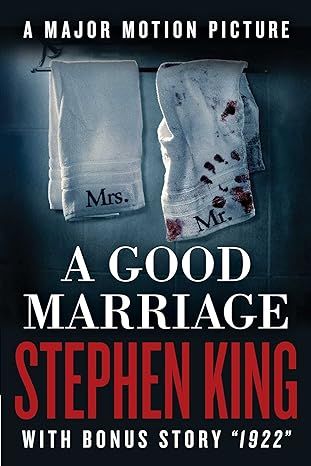
A Good Marriage
4.1
-
5,995
$4.99
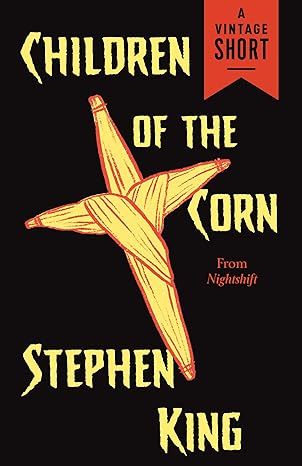
Children of the Corn (Kindle Single) (A Vintage Short)
4.3
-
1,084
$0.99
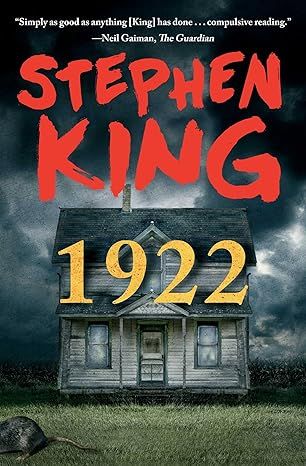
1922
4.6
-
6,082
$7.99
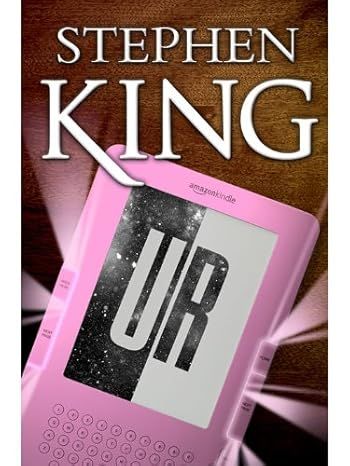
UR
4.3
-
6,140
$3.99
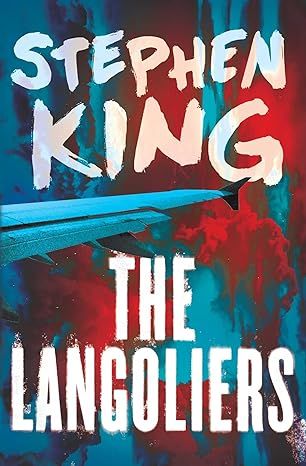
The Langoliers
4.6
-
1,014
$6.49
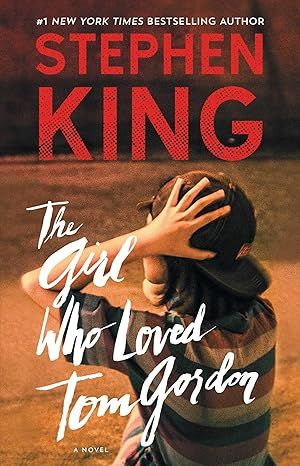
The Girl Who Loved Tom Gordon: A Novel
4.5
-
4,774
$1.17
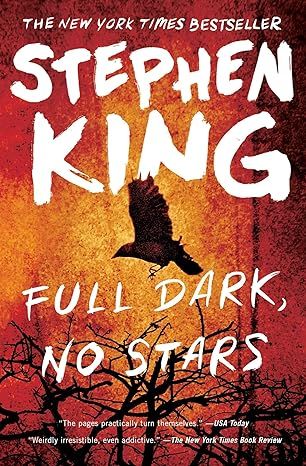
Full Dark, No Stars
4.6
-
6,762
$5.00

Gwendy's Button Box: A Novella (Gwendy's Button Box Trilogy Book 1)
4.5
-
21,335
$3.88
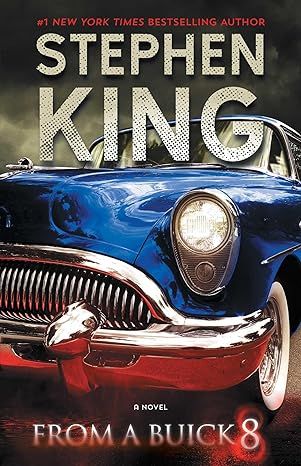
From a Buick 8: A Novel
4.3
-
2,174
$11.99
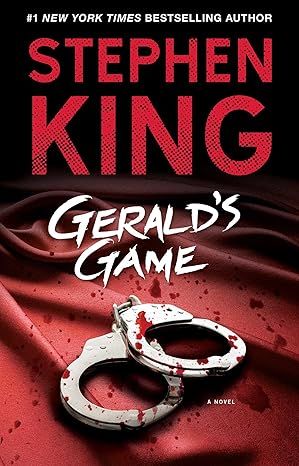
Gerald's Game
4.2
-
3,838
$1.97
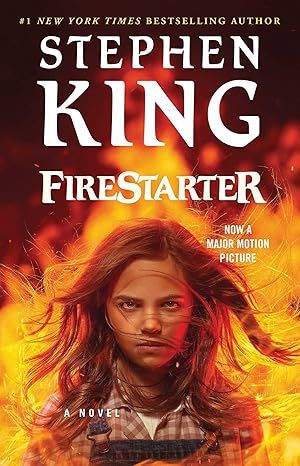
Firestarter
4.6
-
5,489
$9.99
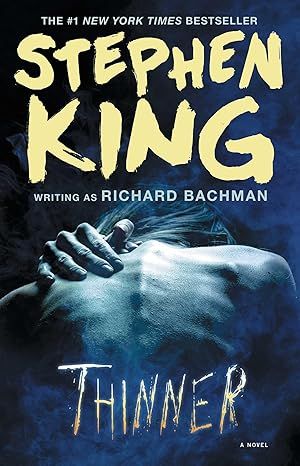
Thinner
4.5
-
3,107
$2.50
Similar Books
Best sellers
View all
The Tuscan Child
4.2
-
100,022
$8.39

The Thursday Murder Club: A Novel (A Thursday Murder Club Mystery)
4.3
-
155,575
$6.33

Sapiens: A Brief History of Humankind
4.6
-
140,302
$13.49

The Butterfly Garden (The Collector, 1)
4.3
-
88,556
$9.59

Things We Hide from the Light (Knockemout Series, 2)
4.4
-
94,890
$11.66

The Last Thing He Told Me: A Novel
4.3
-
154,085
$2.99

The Perfect Marriage: A Completely Gripping Psychological Suspense
4.3
-
143,196
$9.47

The Coworker
4.1
-
80,003
$13.48

First Lie Wins: A Novel (Random House Large Print)
4.3
-
54,062
$14.99

Mile High (Windy City Series Book 1)
4.4
-
59,745
$16.19

Layla
4.2
-
107,613
$8.99

The Locked Door
4.4
-
94,673
$8.53
